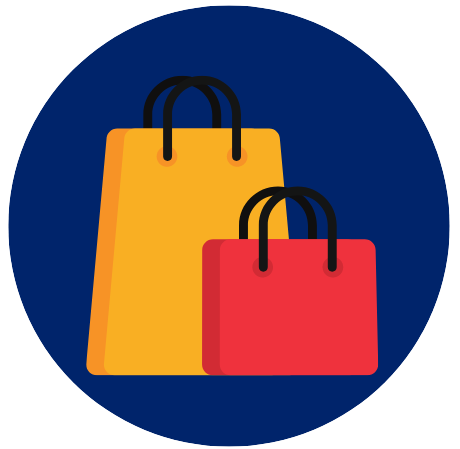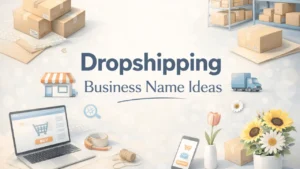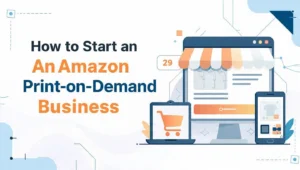Starting an eCommerce business from home has never been easier, thanks to advancements in technology and the widespread availability of digital tools. Whether you’re looking to create a side hustle or a full-time venture, there are countless opportunities to explore. In this blog we show some best eCommerce business ideas for beginners.
The eCommerce industry has experienced explosive growth in recent years, accelerated by the COVID-19 pandemic and changing consumer behaviours.
Statistics and Trends
Here are some key statistics and trends from 2022 to 2024 that highlight the ongoing evolution of this dynamic sector.
Global eCommerce Sales
- 2022: the total global eCommerce sales amounting to up around $5.5 trillion, which was all ample growth over heretofore eve.Inhabitants from remote areas drifted online because of the pandemic. As a consequence, it feels like even more economic opportunities sprang up daily【source: Statista】
- 2023: global eCommerce sales surpassed $6 trillion.The increase was driven by higher internet penetration, improved digital infrastructure and the growing popularity of mobile commerce (mCommerce)【source: eMarketer】
- 2024: it is estimated that global eCommerce sales will have reached nearly $7 trillion. The growth is being driven by technological advances, new markets in developing countries emerged economy types and slowly AI and machine learning penetrating into e-commerce platforms【source: Forbes】
Emerging Markets
- Asia-Pacific: this region, e-commerce was still big cheese in 2023. Over 60 per cent of global e-commerce sales last year were made there. China remains the world’s biggest e-market, ahead of both the United States and Europe combined【source: Statista】
- Latin America Register now: Latin America is the fastest growing e-commerce market of them all. According to eMarketer, its compound annual growth rate (CAGR) will reach 30 % from 2022 to 2024. This growth is being led by Brazil, Mexico but also most importantly by Argentina as well as Colombia and Chile【source: eMarketer】
- Africa: Africa’s e-commerce market will grow rapidly. The percentage of Internet users in each country, together with the speed and cost of mobile telephone networks respectively, should play a big role if this prediction comes true. In 2024, it could become the world’s third largest ECommerce market after only China and America【source: UNCTAD】
eCommerce Mobile Assistant can help you shop for a variety of goods and services, both within the country and across borders. Thanks to their strong focus on this service, they’re betting it has promising prospects. Looked from the back when You Guanxi still worked at Lumen.
What is an eCommerce Business?
An e-commerce business (or internet business) typically involves the buying and selling of goods or services online. ecommerce businesses can range from small startups that are grown at home to large conglomerates online. They sell items both virtual and real, or service provisions. Typically transactions are realized in an online store or even a marketplace where customers can view products, make purchases and arrange delivery.
Types of eCommerce Business Models
- Business to Consumer (B2C): Direct sales between businesses and consumers. Examples include online retailers like Amazon.
- Business to Business (B2B): Transactions between businesses. Examples include wholesale suppliers.
- Consumer to Consumer (C2C): Transactions between consumers, often facilitated by third-party platforms like eBay.
- Consumer to Business (C2B): Individuals sell products or services to businesses, such as freelance services offered on platforms like Upwork.
How to Start an eCommerce Business at Home
Starting an eCommerce business from home involves several steps. Here’s a comprehensive guide to help you get started:
- Identify Your Niche and Product
- Conduct Market Research
- Create a Business Plan
- Choose an eCommerce Platform
- Set Up Your Online Store
- Set Up Payment and Shipping Options
- Develop a Marketing Strategy
- Launch and Optimize
Best eCommerce Business Ideas for Beginners

Here are some of the best eCommerce business ideas for beginners to consider:
1. Dropshipping
You don’t have to store inventory at all in a dropshipping business. You order what you need, when the customer places their order with you for an item, and a third party (usually manufacturer or wholesaler) delivers it directly to them. There is minimal investment in this model and no need for warehouses.
Pros:
- Low startup costs
- No need for inventory management
- Wide variety of products to sell
Cons:
- Lower profit margins
- Less control over shipping times and product quality
2. Handmade Crafts and Goods
One could make good money if free-time hobbies become small businesses. Thanks to Etsy and Shopify, everyone can start one of their own these days and reach out to the whole world online.
Pros:
- High-profit margins
- Creative and fulfilling work
- Loyal customer base for unique products
Cons:
- Time-consuming production process
- Scaling can be challenging
3. Print on Demand
Print-on-demand (POD) opens up the possibility of creating custom-designed mugs, T-shirts and other items that are currently impractical for mass merchandise. By adding an image through your system, printers are able to reproduce that via a print copy on each and every product they sell.
You sell the product, give us your designed image, we print it on and dispatch within a short distance of where this now finished quality goods is going out to customers. This business model looks a bit like drop shipping, except it creates and sells your own design unique products.
Pros:
- No inventory needed
- Ability to offer unique, personalized products
- Easy to experiment with new designs
Cons:
- Lower profit margins
- Dependence on POD service providers
4. Subscription Boxes
Subscription box services have become increasingly popular in recent years. These companies assemble a mix of items, usually with some theme (like beauty or fitness products ), and send them out one by one at regular intervals.
Pros:
- Recurring revenue
- High customer retention
- Opportunities for niche markets
Cons:
- Initial investment for product sourcing
- Inventory management and logistics can be complex
5. Digital Products
Selling digital products of all kinds from eBooks and audio collections to printables like planners software for filtering emails is a great way to start an Ecommerce business with low overhead. Digital products are easy to produce, deliver, and expand.
Pros:
- High-profit margins
- No inventory or shipping costs
- Scalability
Cons:
- Requires expertise in the subject matter
- High competition in some niches
6. Affiliate Marketing
Affiliate marketing is that you advertise for another company’s products and get commissions if they sell from people who clicked on your link. You can put a blog together to write little stories about products, record YouTube videos on specific topics related to the affiliate program so that others are able to both see and hear or play podcasts in iTunes; but it’s even better if your audience enjoys this tough guy act.
horror moviesIf you have an affiliate marketing network of your own, then some people with networking skills can help you promote products across the world.
Pros:
- No need for product creation or inventory
- Passive income potential
- Flexibility to promote a wide range of products
Cons:
- Dependent on the affiliate programs
- Requires significant marketing efforts
7. Niche Online Store
To stand out in the crowded ecommerce market, aim for one or two specific areas. Be it eco-friendly items, pet supplies, classic clothing or heavy-duty workshops–a shop concentrated on its niche will bring your target audience and create a strong brand.
Pros:
- Targeted marketing
- Easier to establish brand identity
- Less competition in niche markets
Cons:
- Limited customer base
- Potential for market saturation
8. Social Media Influencer Merchandise
If you have a large following on social media, maybe you should think about selling your branded stuff. This could include holding up branded clothing lines, accessories or even digital merchandise (such as exclusive content and bite-sized classes).
Pros:
- Built-in customer base
- High-profit margins on branded products
- Enhances personal brand
Cons:
- Requires a large following
- Time-consuming to manage both social media and eCommerce
Conclusion
The idea of starting a business that can be run out of your home already contains many possibilities. Why not build an online business that matches with your skills, interests and resources? That way you have the best chance of succeeding! Remember to keep on learning more about eCommerce and be flexible enough to adapt to change. Good luck with your business.
FAQs
What is the Best eCommerce Business to Start?
Dropshipping is a great option for beginners due to its low startup costs and simplicity.
How Do I Start My Own eCommerce Business?
Selecting a niche, project planning, designing online stores using Shopify and flogging products.
Which eCommerce Business is Most Profitable?
Digital products, such as ebooks and online courses, often enjoy high profitability as a result of the low costs for production or delivery.
What is the Best Online Business from Home?
Print on Demand businesses, creative people will shine in this field, in which you can sell custom designs without inventory.
What is the Richest Online Business?
With its huge range of products and innovative logistics, Amazon is the world’s richest e-business, dominating e-commerce both domestically and internationally.
















